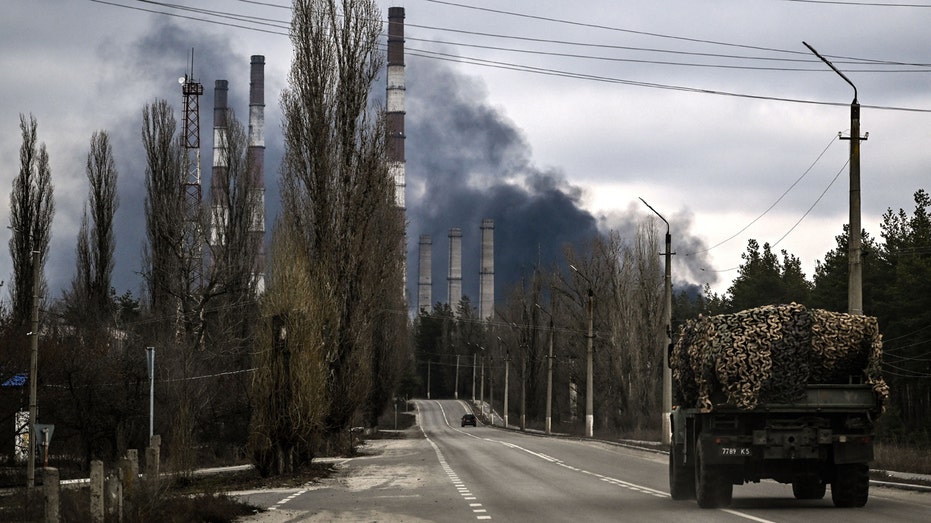Escalating Russia-Ukraine crisis could help the Fed engineer a soft landing
Fed could take less hawkish stance as Ukraine-Russia conflict escalates
Fed raising rate amid Russia-Ukraine conflict may result in ‘recession’: The Bear Traps Report founder
The Bear Traps Report founder and editor Larry McDonald discusses how the Russia-Ukraine conflict is impacting U.S. markets.
The rapidly escalating tensions between Ukraine and Russia have cast fresh uncertainty on the Federal Reserve's policy outlook and could force central bank officials to take a more nimble approach as they begin raising interest rates for the first time in three years.
JPMorgan Chase strategist Dubravko Lakos-Bujas wrote in an analyst note to clients this week that the simmering crisis in Eastern Europe has added to the Fed's slew of worries – including the hottest inflation in four decades. The conflict could ultimately lead central bank policymakers to consider a less hawkish pivot as they prepare for interest rate liftoff.
LIVE UPDATES: RUSSIA-UKRAINE CONFLICT CONTINUES TO ESCALATE
"Overly restrictive monetary policy could result in an outright policy error especially if the business cycle continues to deteriorate," Lakos-Bujas wrote in the note. "At the same time, the Russia/Ukraine crisis could force a reassessment of the Fed tightening path resulting in central banks turning less hawkish, while policymakers may consider additional fiscal stimulus."

A military vehicle drives on a road as smoke rises from a power plant after shelling outside the town of Schastia, near the eastern Ukraine city of Lugansk, on Feb. 22, 2022, a day after Russia recognized east Ukraine's separatist republics and order (ARIS MESSINIS/AFP via Getty Images / Getty Images)
Although many Wall Street banks and traders expected the Fed to chart a very aggressive course in normalizing policy due to surging inflation, that outlook has shifted amid the heightened tensions in Europe.
Although traders still expect the Fed to raise the federal funds rate at its meeting next month, the appetite for a mega, half-point hike has fallen to 32% from over 94% just last week.
Russia has amassed an estimated 150,000 troops on three sides of Ukraine, and President Biden has repeatedly warned that Russian President Vladimir Putin plans to invade the country. Moscow has repeatedly denied that it is planning to attack Ukraine.
The analyst note came as Biden on Tuesday afternoon announced a raft of heavy financial sanctions against Russian banks and oligarchs, accusing Moscow of flagrantly violating international law in what he called the "beginning of a Russian invasion of Ukraine." He pledged to impose more sanctions if Putin continues to escalate the conflict.
"Let me be clear, these are totally defensive moves on our part," Biden said during a brief White House address. "We have no intention of fighting Russia."

In this March 3, 2020, file photo, Federal Reserve Chair Jerome Powell speaks during a news conference to discuss an announcement from the Federal Open Market Committee in Washington. (AP Photo/Jacquelyn Martin / AP Newsroom)
Biden joined the European Union in levying harsh sanctions against Moscow: The 27-member bloc of nations also voted to target Russia over its actions in Ukraine, including Germany announcing that it would halt the certification of the Nord Stream 2 gas pipeline.
RUSSIA SANCTIONED AFTER PUTIN RECOGNIZES REBEL-HELD PROVINCES IN UKRAINE
Russia is the world's second-largest producer of both oil and natural gas; a conflict or sanctions could disrupt the oil market even further at a time when high demand is outpacing tight supplies. OPEC and other oil-producing nations, together known as OPEC+, have resisted calls to boost supply. (Goldman Sachs estimated on Tuesday that oil prices could rise 13.6% in the case of an "outright conflict" between the two nations).
It's unclear how the Federal Reserve will respond to the geopolitical uncertainty – which could create higher inflation in the short term.
"The Federal Reserve pays very close attention to geopolitical events, and this one of course in particular as it’s the most prominent at this point," Michelle Bowman, a Fed governor and a voting member on the policy-setting FOMC, said on Monday. While she noted the U.S. has minor banking, financial and trade interests with Russia – which would not have a "significant impact" on the U.S. economy if a war broke out – she acknowledged there are "potential impacts" on the energy markets.
"Obviously we’ll continue to watch that, and if we believe that might have some influence on the global economy, we’ll take that into account as we’re going into our meetings and discussing the economy more broadly," she said.





















